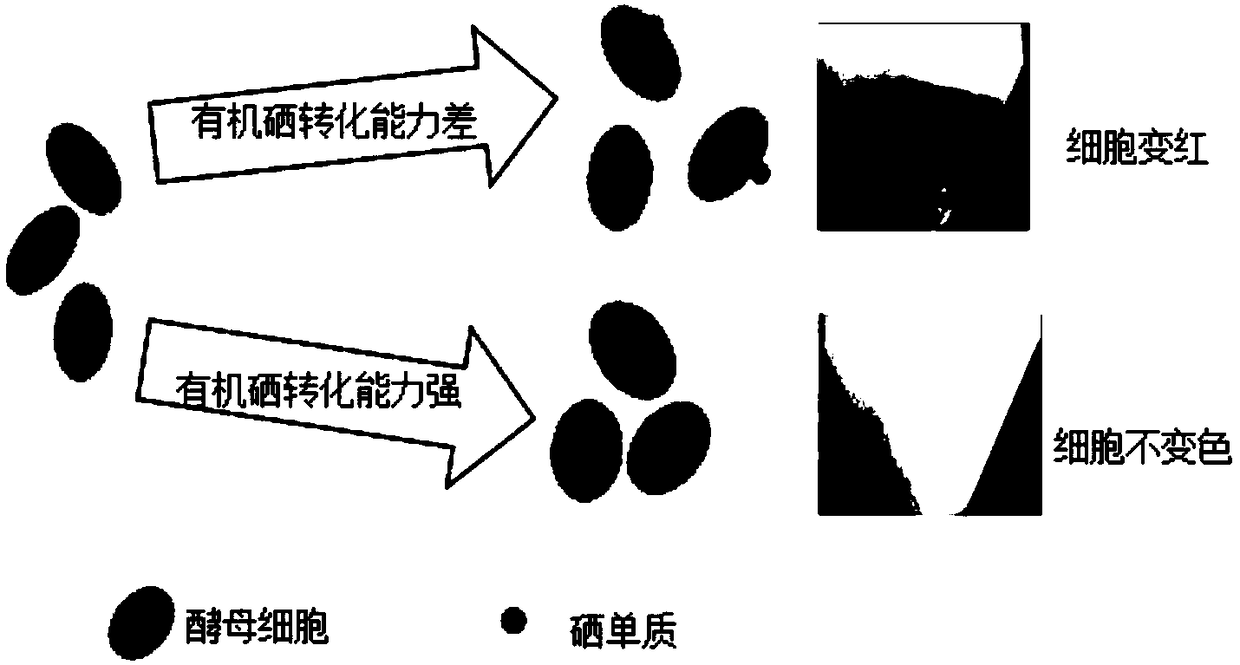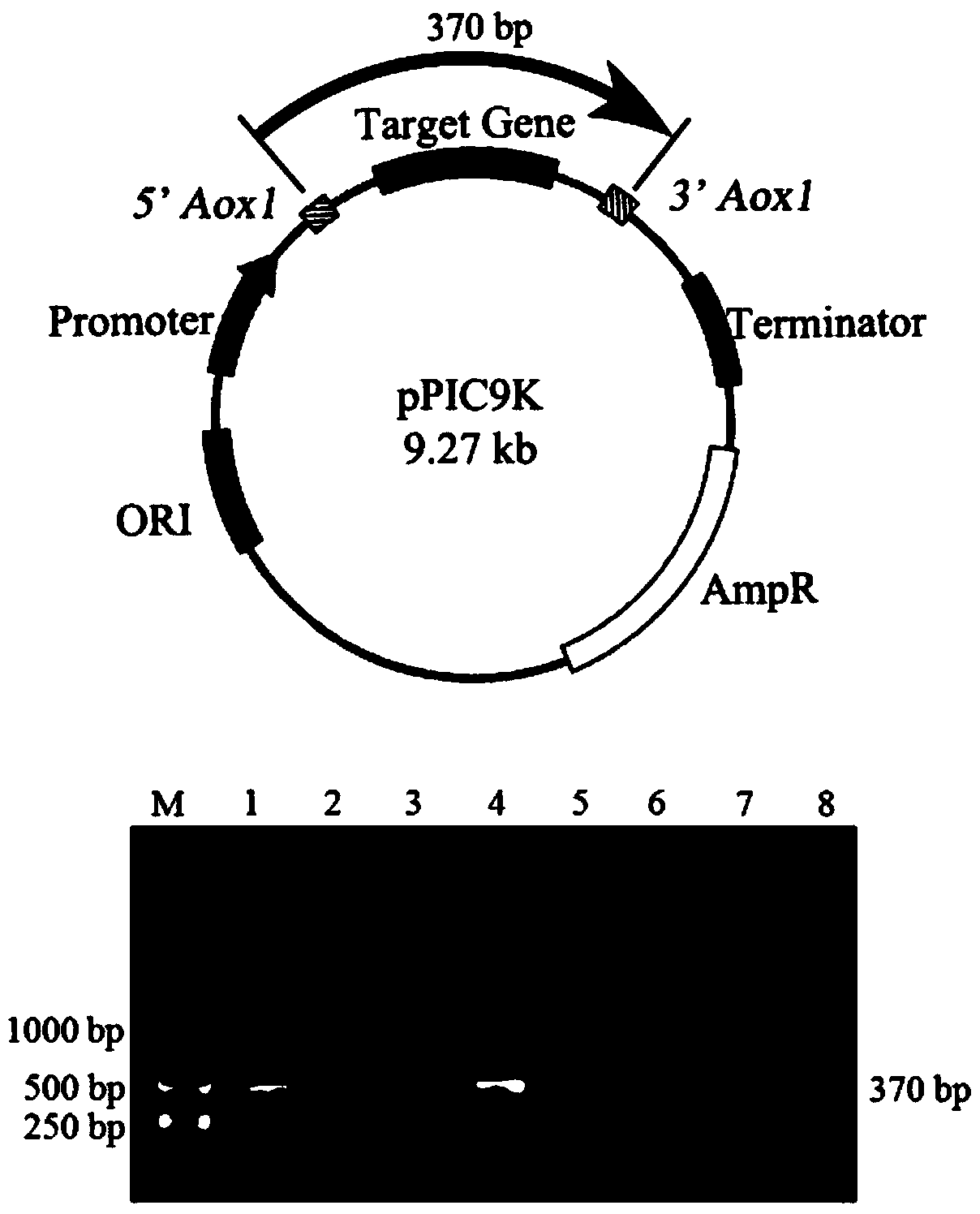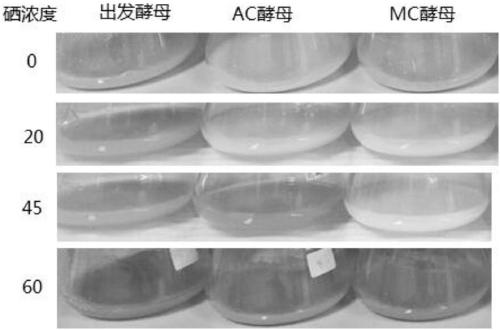Method for improving organic selenium synthesis ability of microorganisms based on sulfur-containing protein overexpression, and application thereof
A microorganism and organic selenium technology, applied in the field of selenium-enriched and organic selenium production, can solve the problems of exceeding the consumption capacity of ordinary people, high price of selenium-enriched yeast products, harsh nutritional conditions of brewer's yeast, etc., and achieve obvious and improved organic selenium conversion effect. Biomass yield and the effect of improving organic selenium yield
- Summary
- Abstract
- Description
- Claims
- Application Information
AI Technical Summary
Problems solved by technology
Method used
Image
Examples
Embodiment 1
[0041] Example 1 Construction of artificially designed AC sulfur-containing protein recombinant yeast and determination of selenium-enriching ability
[0042] 1. Design of artificial sulfur-containing protein AC and its gene sequence
[0043] 1) Artificially design an alanine-cysteine polymer as a sulfur-containing protein, with a total of 40 amino acids (AC40 for short), and its amino acid sequence is (AC)20. Among them, A represents alanine, C represents cysteine, and there are 20 sulfur-containing amino acids, accounting for 50%.
[0044] The total length of the AC gene sequence plus the start and stop codons is 126bp, and the sequence is as follows:
[0045] ATG (GCCTGC) 20 TGA (shown in SEQ.ID.NO.1).
[0046] 2) According to the yeast codon preference, optimize the codon sequence of AC40, determine its gene sequence, and add enzyme cutting sites upstream and downstream as follows:
[0047]
[0048] 2. Construction of recombinant expression vector
[0049] The ge...
Embodiment 2
[0064] Example 2 Construction of artificially designed MC sulfur-containing protein recombinant yeast and determination of selenium-enriching ability
[0065] 1. Design of artificial sulfur-containing protein MC and its gene sequence
[0066] 1) Artificially design a sulfur-containing protein composed of methionine and cysteine, with a total of 74 amino acids (referred to as MC74), which contains several gaps of glycine to meet the requirements of the protein structure, and the sequence is GG(MMMMMMGGCCGG)6. Among them, G represents glycine, M represents methionine, C represents cysteine, and the number of sulfur-containing amino acids is 48, accounting for about 65%. The total length of the MC gene sequence plus the start and stop codons is 228bp, and the sequence is as follows:
[0067] ATGGGTGGT (ATGATGATGATGATGATGGGTGGTTGTTGTGGTGGT) 6 T GA (as shown in SEQ.ID.NO.2).
[0068] 2) According to the yeast codon preference, optimize the codon sequence of MC74, determine its g...
Embodiment 3
[0085] Example 3 Construction of natural MT sulfur-containing protein recombinant bacteria and determination of selenium-enriching ability
[0086] 1. Natural rabbit metallothionein MT and its gene sequence
[0087] The most representative of natural sulfur-containing proteins is metallothionein MT, which is a metal-binding protein naturally formed in the process of biological evolution, and contains more sulfur-containing amino acids—cysteine. Studies have shown that the MT sequence is highly conserved, and the content of cysteine is about 1 / 3 of the total amino acids. In this embodiment, the rabbit source MT protein is selected from the NCBI protein sequence database as a representative of natural sulfur-containing protein, and its amino acid sequence is:
[0088] MDPNCSCPTGGSCSCAGSCTCKACRCPSCKKSCCSCCPVGCAKCAQGCVCKGASDKCSCCA.
[0089] A total of 61 amino acids (MT61), of which C represents cysteine, a total of 20, sulfur-containing amino acids accounted for 32.8%. Addin...
PUM
 Login to View More
Login to View More Abstract
Description
Claims
Application Information
 Login to View More
Login to View More - R&D
- Intellectual Property
- Life Sciences
- Materials
- Tech Scout
- Unparalleled Data Quality
- Higher Quality Content
- 60% Fewer Hallucinations
Browse by: Latest US Patents, China's latest patents, Technical Efficacy Thesaurus, Application Domain, Technology Topic, Popular Technical Reports.
© 2025 PatSnap. All rights reserved.Legal|Privacy policy|Modern Slavery Act Transparency Statement|Sitemap|About US| Contact US: help@patsnap.com



